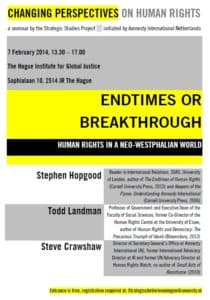 In his compelling, engaging and wide-ranging book The Endtimes of Human Rights, Stephen Hopgood develops a highly critical argument that seeks to account for the biased genesis, dysfunctional enforcement, and precarious future of what have become known as internationally recognized (and increasingly legalized) human rights. For Hopgood, human rights are a secular yet sacred set of claims that have been advanced for human beings by virtue of them being human. The metanarrative that underpins their evolution from the middle of the 19th Century to their current manifestation in an increasingly complex array of international legal instruments is a product of European middle class intellectuals that is akin with what Pierre Bourdieu has called ‘social magic’; the performative concept that captures the idea that certain ‘speech acts’ create significant political outcomes.
In his compelling, engaging and wide-ranging book The Endtimes of Human Rights, Stephen Hopgood develops a highly critical argument that seeks to account for the biased genesis, dysfunctional enforcement, and precarious future of what have become known as internationally recognized (and increasingly legalized) human rights. For Hopgood, human rights are a secular yet sacred set of claims that have been advanced for human beings by virtue of them being human. The metanarrative that underpins their evolution from the middle of the 19th Century to their current manifestation in an increasingly complex array of international legal instruments is a product of European middle class intellectuals that is akin with what Pierre Bourdieu has called ‘social magic’; the performative concept that captures the idea that certain ‘speech acts’ create significant political outcomes.
Hopgood argues that the sacred metanarrative of human rights has been symbolized through great architectural temples in Geneva (Palais des Nations), New York (UN Headquarters), and in the future, The Hague (the planned home for the International Criminal Court). The metanarrative has also been developed in ways that has largely ignored gross roots and organic struggles against oppression leading to the gulf between what Hopgood calls human rights (localized and self-styled struggles) and Human Rights (international sacred discourse). The elitist and sacred nature of Human Rights has its own set of codes and conventions, and has become a hermetic community that has little relevance for the every day struggles for justice taking place at the local level.
Despite their sacred and self-evident nature, the mechanisms for the enforcement of human rights have been notoriously weak and over-reliant on the power and purpose of the United States, which has led to a human rights double standard (mixed application with wildly varying results) and marketization (professionalization of large and wealthy human rights NGOs). These twin attributes have undermined the very ideals of the human rights movement and created patchwork application of universal standards. Moreover, and the subject of this essay, the rise of Brazil, Russia, India and China (BRICs) challenges US (and European) hegemony in the world in ways that have created what Hopgood calls a ‘neo-Westphalian’ world, where the probability of successful protection of human rights is more limited than ever.
Many of these arguments put forth in the book resonate with my own experiences and I thus find much of what Hopgood argues to be less problematic than one would assume given my career as a political scientist of human rights. My essay for next week's event in The Hague charts a bit of my own experiences in the world of human rights and then addresses a series of Hopgood’s claims based on extant empirical literature on human rights.
The argument is developed in four stages:
First, I argue that Hopgood does not offer anything particularly shocking or new, since political science has long been skeptical about the growth and effectiveness of the international human rights regime and its reliance on commitment from powerful states.
Second, I embrace his exaltation of local grassroots human rights groups, but argue that Human Rights as he conceives it can contribute to this struggle by providing important legal standards, public discourses and political levers that help local groups realize their aims.
Third, I argue that the rise of the BRICs and now the MINTs (Mexico, Indonesia, Nigeria and Turkey) may challenge US and European hegemony and represent new nodes of power and influence that have a negative impact on human rights; however, in terms of market size and material capabilities, the only real contender in the world for the medium term is China.
Finally, I argue that his worry over the assertion of nationalism and religion is overly critical and that the emergence of Pope Francis and survey data on values illustrates more hope for human rights in the future than Hopgood concedes.
I will present the full paper next week in The Hague, after which it will be published along with other papers by Amnesty International. Click here for my book: Democracy and Human Rights: The Precarious Triumph of Ideals and click here for my new article on human rights and the case of Chile published by Revista Politica.
Contact
T 07584 615104
E info@todd-landman.com
Keep In Touch
Todd Landman. All Rights Reserved
A Mackman Group collaboration - market research by Mackman Research | website design by Mackman